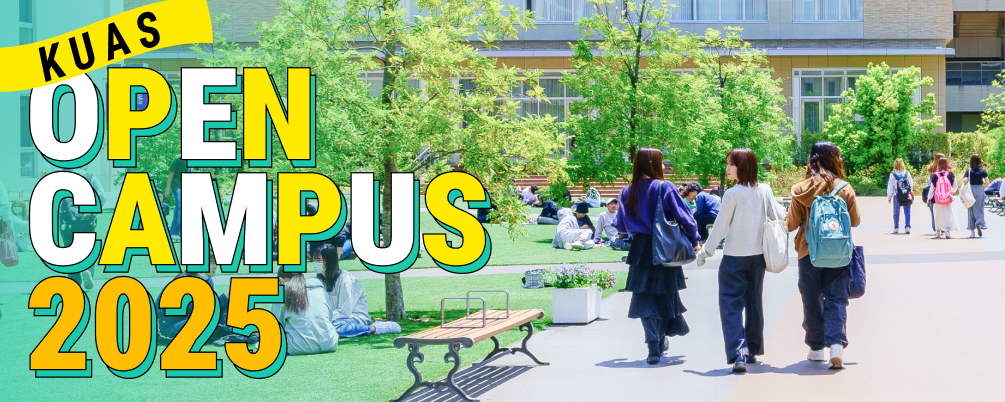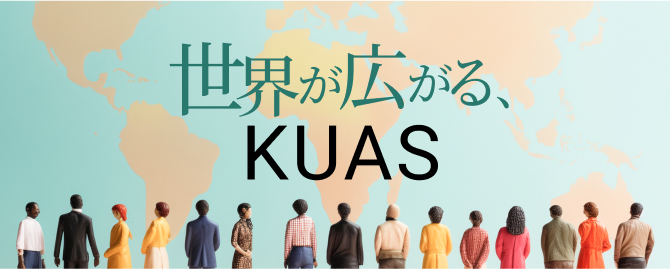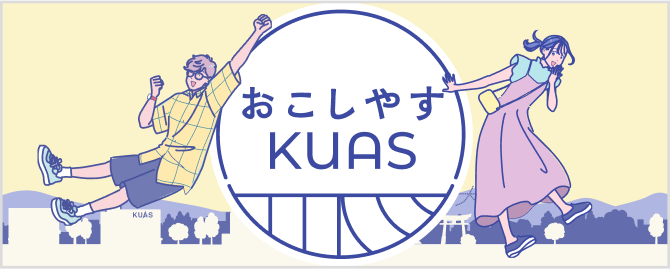第9回「トンガリ人材への道~How do I get there?~」開催

2022年05月13日
京都・滋賀・北大阪を営業地域として地域社会の発展に寄与する京都信用金庫(以下京信)理事長 榊田 隆之氏が、4月20日(水)に京都太秦キャンパスへ来学され、100名以上の参加者に対して、スマートフォン等を活用したインタラクティブな講演を行った。テーマは「時代の潮流変化とこれからの金融のあるべき姿」。
「金融って温かくて熱いもの。一緒に未来を考える時間としたい」という言葉で始まった講演。榊田理事長の生い立ちから、これからの金融機関の在り方について、実践例を交えて語られた。
学生を中心とする参加者は、熱心に講演を聞く一方で、自分のスマートフォンを使って質問やコメントを書き込み、その内容を見て榊田理事長がリアルタイムに反応するという講演の進め方自体が、まさに時代の潮流の変化を感じさせるものであった。
自分のスタンスを大切にした結果、生まれた今の京信の姿
―全ての経験と判断が今の自分に繋がっている
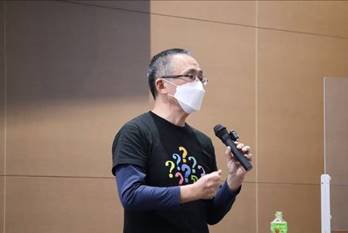
祖父が京信の創設者だが、まさか自分が継ぐとは思ってもいなかった。小学校4年生の時に初めて訪れたアメリカではカルチャーショックを受け、若干10歳にてアメリカ留学を決意。中学校から親元を離れ上京し、英語の勉強を始め、その努力が実り、アメリカ東海岸の全寮制高校へ入学。アメリカでは人種差別や英語に悪戦苦闘する過酷な4年間を過ごしたが、今の経営観にもつながる貴重な経験をすることが出来たと語る。
大学から日本に戻り、大学時代はテニスに没頭した。その腕前は大学トーナメントで優勝するほど。卒業後はグローバルな仕事を求めて国際協力銀行へ就職したが、父の急逝を機に、現職を継ぐ決心をした。継ぐかどうかを本気で迷い、周りにもたくさん相談した。今思うのは、全ての経験が今の自分へ繋がっていて、地域の街づくりや地域を元気にする現職を天職だと思えていることだ。
―金融で起こっているパラダイムシフト、排除から包摂への変化とは
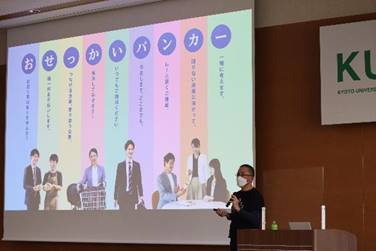
今世界は大きく変化している。繰り返される景気循環ではなく、大きくかつ本質的な潮流の変化、パラダイムシフトが起こっている。世の中の先行きが見えないと嘆く人ではなく、どのような変化にも対応していく柔軟な自分を創っていく姿勢が大切になる。
21世紀型の組織は排除型だったが、これからは包摂型にならなければいけない。地域金融機関も社会を包摂していくことが強く求められる。例えば、金融機関は小さな取引先(スモール)には冷たい、実績や担保がない取引先(スタートアップ)には冷たい、業績が悪化している取引先(スランプ)には冷たい等と言われることがあるが、これらはまさに排除型の考え方である。
一方で包摂型に考えると、人と人をつなぎ、本当に困っている人を助ける、これが京信のテーマとしている「京都おせっかいバンカー」の在り方である。従来の様に財務的な課題だけではなく、より本質的な、つまり事業の拡大や人づくり・組織作り、コストコントロール等にも積極的に支援を提供しなければ金融機関は生き残ることが出来ない時代になっている。
―営業成績ではなく、顧客本位が地域課題を解決する
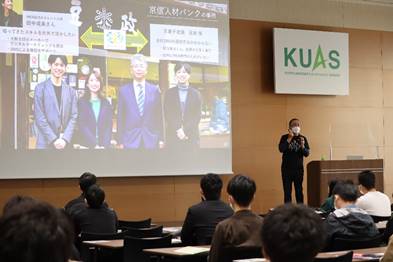
課題解決にフォーカスするということは、銀行マンが自らの営業成績を達成するために必死になるのではなく、徹底的に顧客本位になるということでもある。コロナ禍の影響で、地域のいちご農園の販売が不振になったことがあった。担当営業マンは知恵を振り絞り、自ら仲間を集め、「移動式いちご狩り」というアイディアを構想。農園の営業担当と一緒に汗を流して営業に回った結果、あべのハルカス近鉄本店屋上スペースという一等地にて初の移動式いちご狩りを実現することができた。取引先である農園と二人三脚で開拓した新事業。農園からは「ずっとそばにいてほしい営業マンです」という嬉しい言葉を貰うことができた。この例は、まさに京信が大切にする「京都おせっかいバンカー」のひとつの理想形だ。
この取り組みを一歩進めるべく、京信社内ベンチャーとして、20代の若手2名が共同社長になり地域の人材ネットワークを活かす「京信人材バンク」を立ち上げた。取引先の人材交流を活性化するための仕組みだ。このひとつの成果として、SNS運用に悩んでいた京都の老舗和菓子メーカーに、大阪のメーカーで長くデジタルマーケティングを行っていたSNS運用のプロをつなぎ、副業として活躍してもらうことができた。このデジタルマーケティングのプロ人材は、自らが苦労して作り上げてきたSNS運用の仕組み・ノウハウを、地域のために幅広く活かしたいと望んでいた。能力だけではなく個人の想いまで含めて人と人を繋ぐ、共感で繋ぐ輪を広げるということが、地域の課題解決に必要な重要な視点だ。
榊田理事長のコメントから見える未来
―競争から共創へ、Commons の重要性とQuestionの存在意義

ひとつの会社で完結する時代は終わった。私の好きな言葉である Beyond Boundariesは、いわば他流試合ということだ。自分と同じような人とだけ話していてもイノベーションは起こらない。これからは他社とのコラボレーションで新しい産業を興す時代になる。
この時代を見据え、京都のど真ん中にQuestionという施設をつくった。単なる綺麗なコワーキングスペースではない事を象徴するのが「問いの掲示板」だ。掲示板には地域の課題を自由に書くことができ、200人の共感の輪でつながるプロフェッショナルが寄ってたかって解決策を持ち寄る。参加者は普段別の仕事をしているが、社会課題を解決したいという共通の想いで繋がっている。21世紀はネットワーキングの時代だ。インターネットも重要だが、共通の想いと場所、すなわちQuestionという名のCommonsを用意することで、人と人のつながりを強くすることができる。Questionには学生向けのスペースもあるので、みなさんにもぜひ参画してほしい。
―真のソーシャル企業を目指して
スモール・スタートアップ・スランプの取引先に加えて、京信が金融包摂に取り込んでいきたいのは、もうひとつのS、ソーシャル企業だ。ソーシャル企業になるためには、消費者の意識と企業の意識、どちらも同時に変わらなければならない。京信は、まず企業側を支援する仕組みとして、公的な認証を開始した。将来的には融資先の8割をソーシャル企業にしていく計画だ。次に、消費者側を変える仕組みとして、新たにソーシャルグッド預金という取組を開始した。これは、預金がどのような社会課題の解決に利用されているかを預金者が決められるサービスだ。今のところは京信のみの取組だが、将来的には世間の主流になるだろう。

また今の時代は、多様であり複雑だと捉えられるが、逆にコミュニケーションと対話の力で変化を起こせるシンプルな世界だと考えている。京信では2000名の従業員と対話型集会を繰り返しながら、ボトムアップのアイディアを大切にし、結果としてノルマ廃止、服装自由等の変化を生み出している。
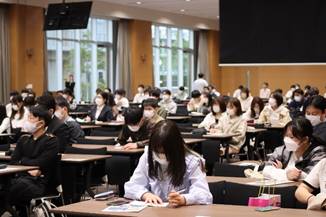
最後にこれから社会に出る皆さんと良い会社とは何かを一緒に考えたい。良い会社とは良い理念だけではなく、人をイキイキさせる工夫や風土、そして働いている人がイキイキしているかどうかが重要である。この考え方と寄ってたかっての発想を大事にして頂きながら、皆さんが新しい時代を創っていくことを期待している。
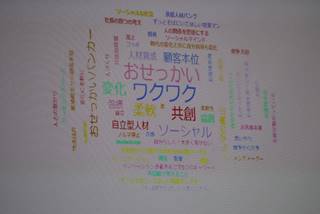
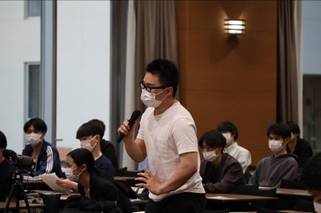
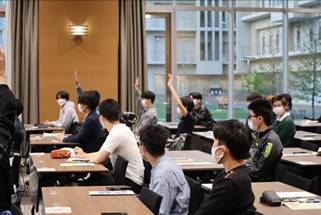
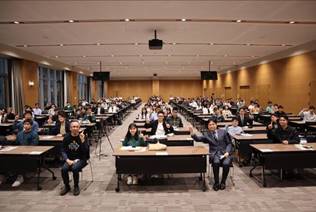
学生の声
Questionにぜひ行ってみたいと思います!ありがとうございました。(経済経営学部 経営学科 3年生)
本日は貴重なお時間ありがとうございました。経営者としての実際の体験談を聞くことが出来、とても参考になりました。私は嫌な仕事にもし就いたとしたらすぐに辞めてしまうのではないかと不安になっていましたが、榊田さんの話を聞いてから、まずはしんどいこともやってみてそれなりに出来る様になるまでは続けて頑張ってみようと思えるようになりました。しんどい事や嫌な事はこれからたくさんあると思いますが、我慢強く自分を持って仕事に励んでいきたいと思いました。
(経済経営学部 経営学科 3年生)
今後人生を歩んでいく上で重要となる心構えを学ぶことができました。ただブランド志向で大手の企業に入るのではなく、自分がワクワクしながら働くことのできる「いい会社」を選ぶ。これをするために自身と異なるフィールドの人たちと積極的に交流をはかり、視野を広げ、既存の価値観にとらわれることない柔軟な姿勢を身につけていく心構えを持って日々の生活を歩んでいきたいと感じました。
(人文学部 心理学科 3年生)
これまで持っていた金融機関のイメージが覆されました。また、どういった思いで京都信用金庫の理事をされているのか、真のソーシャル社会はどうあるべきかを聞き、来年から社会へ出る際に今回学んだ事を大切な価値観として持っていきたいと感じました。
(経済経営学部 経営学科 4年生)
第9回 2022年4月20日(水) <終了>:
| テーマ | 「自分が主人公にならないと、仕事の満足感は湧かない!」 |
| 講演者 | 榊田 隆之 氏 京都信用金庫 理事長 |
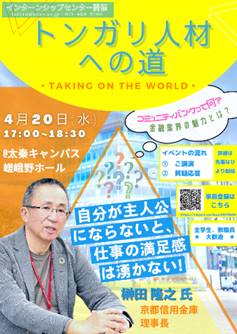
(インターンシップセンター 青木 望)
“Becoming a Top-tier Talent ~ How Do I Get There?” Round 9 Changing Times and the Future of Finance Hosted by the Internship Center
Takayuki Sakakida is the chairman of the board of directors at the Kyoto Shinkin Bank (Kyoshin), a company which contributes to the development of local communities in its operating regions of Kyoto, Shiga, and Kita-Osaka. Mr. Sakakida visited the Kyoto Uzumasa Campus on Wednesday, April 20 and delivered an interactive lecture using smartphones and other devices to more than 100 participants. The theme was “Changing Times and the Future of Finance.”
The lecture began with the words, “Finance is dynamic thing. I want to take time to think about the future together.” Using examples from his career, Mr. Sakakida talked about the future of financial institutions.
The participants, mostly made up of students, were able to use their smartphones to write questions and comments to which Mr. Sakakida could respond to in real time as they listened intently to his lecture. This modern style of lecture was truly indicative of the changing tide of the times.
Today’s Kyoshin, born out of valuing one’s own stance
Your own experiences and judgments inform who you are

His grandfather was the founder of Kyoshin, but he never expected to succeed him as chairman. He first visited the United States when he was in the 4th grade of elementary school and was so shocked by the culture that he decided to study in the United States when he was only 10 years old. He left his parents for Tokyo after junior high school and began studying English. His efforts paid off when he was accepted into a boarding high school on the East Coast of the United States. He spent four grueling years in the United States, struggling with racism and English, but he says he was able to gain valuable experience that was essential for his current management outlook.
He then went on to return to Japan for university and subsequently immersed himself in tennis, becoming so good that he was able to win his university tournament. After graduation, he sought a global job at the Japan Bank for International Cooperation, but following the sudden death of his father, he decided to take over at Kyoshin. He seriously hesitated over whether to succeed his father or not, and consulted many people in his circle. Mr. Sakakida believes that all his experiences have led him to where he is today, and that his current position is a calling to build up and revitalize the local community.
– The paradigm shift in finance, changing from an exclusionary to inclusive system

The world is currently undergoing drastic changes. Instead of a recurring business cycle, there is a major and substantial change in the tide, a paradigm shift. It is important not to be a person who laments that the future of the world is uncertain, but to create a flexible self that can adapt to any changes.
The current 21st century-style organization has been exclusionary, but now it must become inclusive. Regional financial institutions as well as society itself are urged to embrace this change. For example, financial institutions are sometimes thought to give the cold shoulder to small business partners, those without track records or collateral (i.e. startups), and those with slumping business performance. This kind of behavior is exclusionary thinking.
On the other hand, if we think in an inclusive way we should consider how to connect people and help those in real need. This inclusive nature is essential to Kyoshin’s philosophy of the “busybody banker.” We are entering an era in which financial institutions cannot survive unless they actively provide support not only for financial issues as in the past, but also for more substantial tasks such as business expansion, personnel development, and cost control.
-Customer focus, not sales performance, solves regional issues

Focusing on problem solving also means that bank employees will need to be thoroughly customer-oriented rather than focused on their own earning figures. Mr. Sakakida gives an example of when the sales of a particular regional strawberry farm slumped due to the impact of the Coronavirus pandemic. The sales representative in charge put his wits to work, consulting with his colleagues to conceive the idea of “mobile strawberry picking.” As a result of cooperation with the sales representatives of the farm, Kyoshin established the first mobile strawberry picking in a prime location, the rooftop space of Abeno Harukas Kintetsu Main Store in Osaka. By working in tandem with the client farm, a new business opportunity was able to be established. The client went on to praise the representative, saying that they wanted to have the sales representative by their side permanently. This example is an ideal form of the “Kyoto busybody banker” that Kyoshin values.
In order to take this initiative one step further, two young people in their twenties became co-presidents of the Kyoshin Jinzai Bank, which incorporates the local human resources network. This is a mechanism to encourage personnel exchanges among business partners. As a result of this, Kyoshin was able to connect a long-established Japanese confectionery maker in Kyoto, who had been struggling with social media management, with an industry professional from an Osaka manufacturer who had long been engaged in digital marketing, and have them work for the confectionery maker as a side job. The digital marketing professional wanted to make extensive use of the social networking system and know-how they had worked so hard to build for the community. Expanding one’s circle through empathy, including not only one’s abilities but also their ideas, is an important perspective needed to solve regional issues.
The future as seen by Mr. Sakakida
-From competition to collaboration, the importance of the Commons and the raison d’etre of Question

Gone are the days of everything being done by one company. Beyond Boundaries, is a favorite term of Mr. Sakakida, You can’t innovate by talking only to people like you. From now on, there will be an era of collaboration with other companies to create new industries.
Looking ahead to this era, he built a facility aptly called Question in the heart of Kyoto. The facility is not only a modern communal working space, but is also a forum for questions. People are free to write local issues on the bulletin board, and 200 professionals in various fields come by to offer solutions. The participants usually have different jobs, but they are connected by a common desire to solve social problems. The 21st century is the age of networking. The Internet is important, but having a common area for sharing ideas can strengthen the connection between people. Question also has a space for students, so we encourage you to participate sometime.
-Aiming to be a true social company
In addition to its clients in the small startup slump, Kyoshin wants to tap into financial inclusivity in another “S”: social enterprises. To be a social company, consumer awareness and corporate awareness must both change at the same time. To kickstart this, Kyoshin has started public certification as an initiative to support businesses. In the future, it plans to turn 80% of its borrowers into social enterprises. Next, as a mechanism to change the consumer side, they launched a new project called Social Good Deposit. It’s a service that allows depositors to decide what social issues their funds are being used to solve. For the time being, it is being solely led by Kyoshin, but it will hopefully become mainstream in the coming years.

Mr. Sakakida sees the current era as diverse and complex, but conversely, a world that can be made simple through the power of communication and dialogue. Kyoshin repeatedly holds interactive meetings with its 2000 employees and values bottom-up ideas, resulting in such changes as the elimination of quotas and dress codes.

Finally, Mr. Sakakida gave some advice to students set to join the workforce. A good company is not only about good principles, but also ideas and a climate that makes people excited, and whether or not the people working there are excited. Mr. Sakakida hopes that students will create a new era with this way of thinking.
-Photos




Student Voices
I would love to visit Question! Thank you very much.
(Faculty of Economics and Business Administration, Department of Business Administration, 3rd Year)
It was very helpful to hear about Mr. Sakakida’s actual experience as a manager. I was worried that if I got a job that I didn’t like, I would quit right away, but after listening to Mr. Sakakida’s story, I began to think that I should try hard things first and keep trying until I’m able to do them properly. I know there will be a lot of hard and unpleasant things coming, but I want to have patience and work hard at my future job.
(Faculty of Economics and Business Administration, Department of Business Administration, 3rd Year)
I was able to learn the mindset that will be important for me going forward in life. Instead of just being brand-conscious and joining a major company, I should choose a “good company” where I can work passionately. To do this, I wanted to actively interact with people from different fields than my own, broaden my horizons, and live with the mindset to develop a flexible attitude free from preconceived notions.
(Faculty of Humanities, Department of Psychology, 3rd Year)
The image I had of financial institutions has been transformed. I also asked him about his thoughts as a chairman of Kyoto Shinkin Bank and what a truly social society should be, and I felt that I will take the values I internalize into the outside world when I join the workforce next year.
(Faculty of Economics and Business Administration, Department of Business Administration, 4th Year)
Round 9, Wednesday, April 20, 2022:
| Theme | “Find fulfillment in work: Become your own protagonist!” |
| Speakers | Mr. Takayuki Sakakida The Kyoto Shinkin Bank Chairman |

(Internship Center: Nozomi Aoki)

